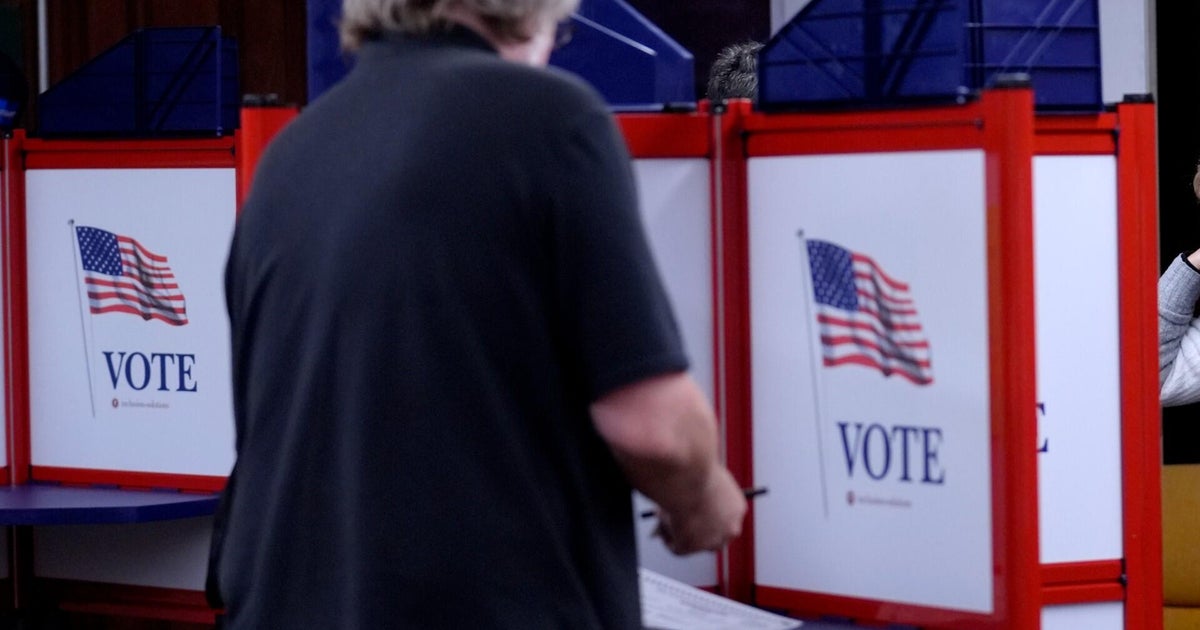Politics
California finance agency opposes child sex trafficking bill, cites potential prison inmate costs
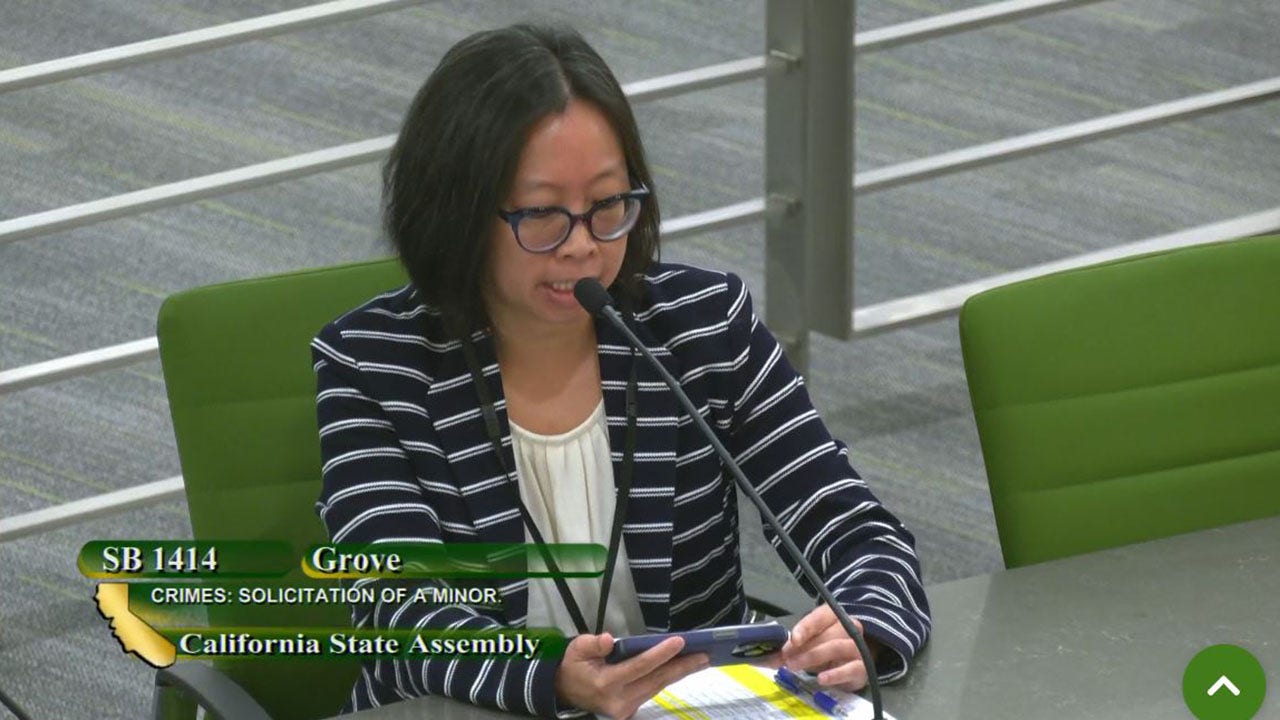
A bill that would increase penalties for child sex buyers in California could die before getting a vote amid concerns from state finance officials over the costs of housing additional prison inmates.
California lawmakers last week placed Senate Bill 1414 on “suspense file,” a list of bills that are expected to cost the state a significant amount of money, during an Aug. 7 meeting. The bill will either advance or be killed without public discussion in a special Thursday hearing.
“When we pursued this to prevent children from being trafficked, bought and sold in the state of California, we never thought in a million years it would be this difficult,” Republican state Sen. Shannon Grove, who introduced the legislation and is its primary sponsor, told Fox News Digital.
GOV NEWSOM ORDERS HOMELESS ENCAMPMENTS TORN DOWN ACROSS CALIFORNIA: ‘NO MORE EXCUSES’
California state Sen. Shannon Grove, a Republican, speaks to lawmakers about Senate Bill 1414 during an Aug. 7 hearing. (California Assembly Appropriations Committee)
The bill would allow prosecutors to charge adults charged with soliciting minors with a felony. If the minor is younger than 16, or younger than 18 but a victim of human trafficking, the defendant would face up to three years in prison and a $10,000 fine.
The bill would also require adults convicted multiple times of soliciting a minor at least 10 years younger than them to register annually as a sex offender. Under the current law, soliciting or purchasing a minor for sex is a misdemeanor punishable by a minimum of two days in jail and up to a year or a fine.
During last week’s Assembly Appropriations Committee hearing, a representative for the California Department of Finance spoke in opposition to the bill.
“California has successfully remained below the court-ordered prison population cap and has even made strides towards closing prisons, resulting in hundreds of millions of dollars in annual savings,” Millie Yan, a Finance Department official, told lawmakers. “However, increases to the (prison) population threaten the state’s ability to continue making progress in right-sizing California’s prison system.”
The annual costs associated with increasing the prison population by one inmate can range from $10,000 to tens of thousands of dollars, she said.
“We also note that similar legislation that expands the list of individuals required to register as sex offenders has estimated to result in costs to the Department of Justice in the hundreds of thousands of dollars,” said Yan.
Grove and other lawmakers have dismissed financial concerns, arguing the potential cost pales in comparison to combating a significant problem across the state.
ELON MUSK ANNOUNCES X, SPACEX HQS WILL MOVE FROM CALIFORNIA TO TEXAS AFTER NEW GENDER IDENTITY LAW
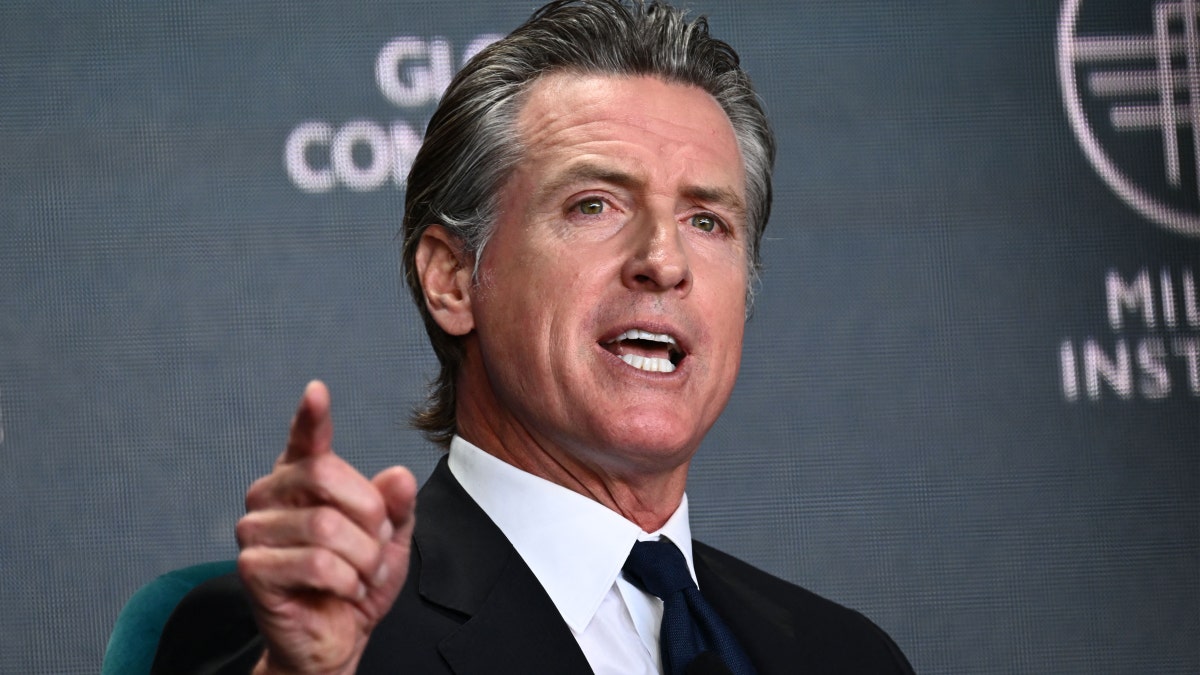
California Governor Gavin Newsom speaks during the Milken Institute Global Conference in Beverly Hills, California on May 2, 2023. (PATRICK T. FALLON/AFP via Getty Images)
“We’ve spent $24 billion on the homeless population, and it got worse,” Grove said of California’s efforts to address its growing homeless population. “And they’re worried about spending tens of thousands of dollars on the prison population to lock individuals up who are buying children for sex?”
California Gov. Gavin Newsom supports the bill, his office said. The governor’s office pointed to a Monday social media post when contacted by Fox News Digital.
“It’s standard practice for DOF to oppose bills that have a fiscal impact when not addressed via the budget,” the post states. “It’s NOT a position on policy or merits. The Governor SUPPORTS this bill.”
California state Assembly Republican leader James Gallagher said the issue of child sex trafficking shouldn’t be a “financial question.”
“It should be a right and wrong question,” he told Fox News Digital, while noting the billions of dollars California has spent to fix homelessness and the ballooning costs for a proposed high-speed rail project. “They are funding all of those things fully… but they don’t have money to make sure that johns buying children go to prison. If that’s the case, their priorities are seriously misplaced.”
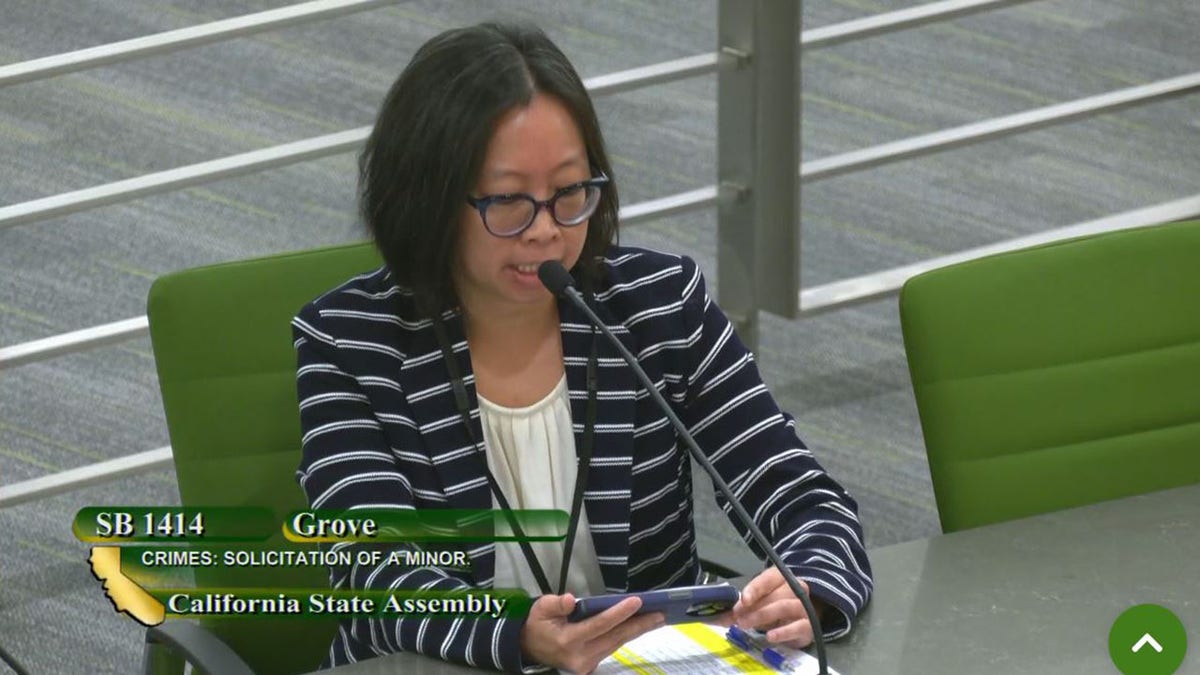
Millie Yan, a California Finance Department official, spoke in opposition to SB 1414 during an Aug. 7 state Assembly hearing. Gov. Gavin Newsom supports the bill, his office said. (California Assembly Appropriations Committee)
He also urged Newsom to take charge as the executive of the state and push for similar policies.
In addition to financial concerns, Grove said she was forced to make amendments to SB 1414 by the Democratic-controlled Senate Public Safety Committee.
That resulted in the exclusion of 16 and 17-year-olds from the protection provided, she said. These individuals are now required to prove that they are victims of trafficking in order for the perpetrator to be charged.
Fox News Digital has reached out to state Sen. Aisha Wahab, chair of the committee.

Politics
Video: Why the U.S. Brought Back Kilmar Abrego Garcia

new video loaded: Why the U.S. Brought Back Kilmar Abrego Garcia
Kilmar Abrego Garcia, who was mistakenly deported to El Salvador, was flown back to the United States on Friday to face federal criminal charges. Devlin Barrett, who covers the Justice Department, explains the charges and what may come next for Garcia.
Recent episodes in Politics
Politics
National Guard to be deployed in Los Angeles County as anti-ICE protests rage: border czar Tom Homan
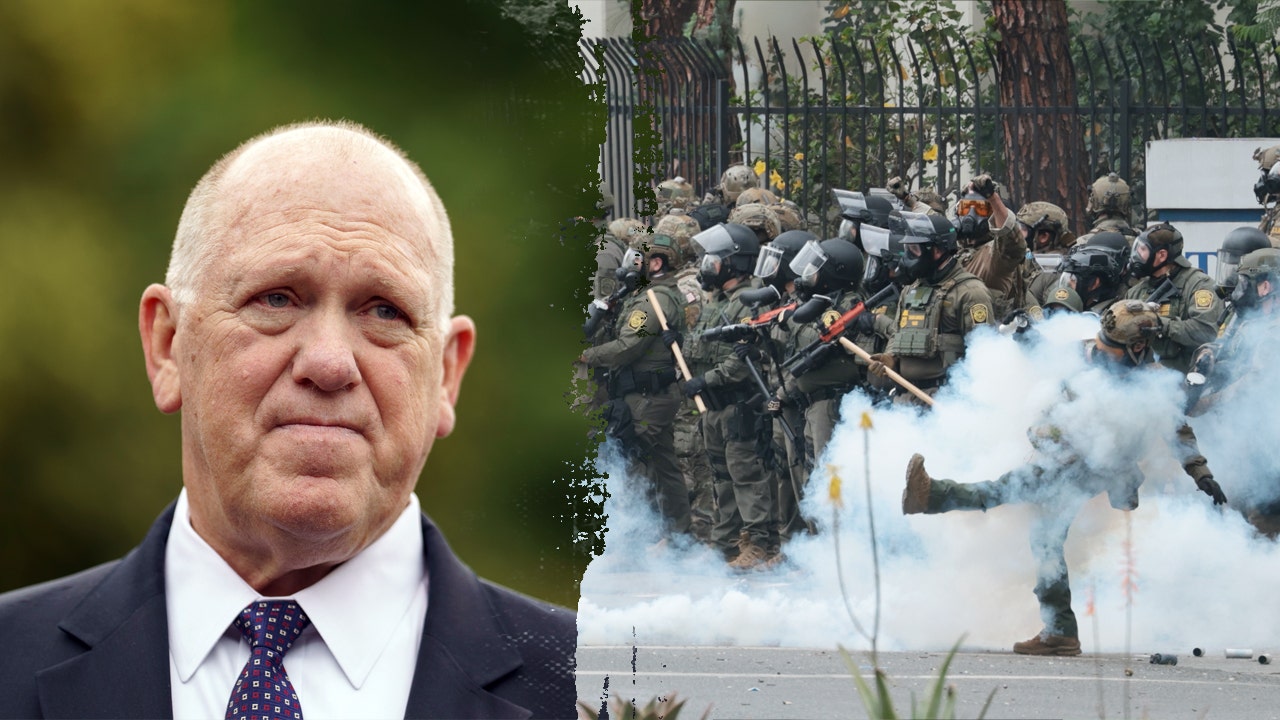
NEWYou can now listen to Fox News articles!
The National Guard will be deployed to Los Angeles County after anti-ICE protests continued to escalate Saturday afternoon, Trump administration border czar Tom Homan told Fox News Saturday.
On Saturday, tear gas was deployed near Home Depot in Paramount, California, where Immigration and Customs Enforcement (ICE) officers were allegedly conducting a raid.
Following the raid, a violent protest broke out and several arrests were made for assault on a federal agent, according to U.S. Border Patrol Chief Michael W. Banks.
President Donald Trump took to Truth Social to call out state and local leadership’s inaction.
“If Governor Gavin Newscum, of California, and Mayor Karen Bass, of Los Angeles, can’t do their jobs, which everyone knows they can’t, then the Federal Government will step in and solve the problem, RIOTS & LOOTERS, the way it should be solved!!!” Trump wrote.
People block off the street and set a fire during protests against ICE and immigration raids on Saturday, June 7, 2025 in Paramount, CA. (Myung J. Chun / Los Angeles Times via Getty Images) (Myung J. Chun / Los Angeles Times via Getty Images)
FEDERAL OFFICIALS SLAM DEMOCRATS FOR ‘DANGEROUS’ RHETORIC AS ICE AGENTS FACE VIOLENT MOBS IN LA, NYC
Newsom responded on X, claiming the federal government “is moving to take over the California National Guard” and deploy 2,000 soldiers.
“That move is purposefully inflammatory and will only escalate tensions,” Newsom wrote. “LA authorities are able to access law enforcement assistance at a moment’s notice. We are in close coordination with the city and county, and there is currently no unmet need. The Guard has been admirably serving LA throughout recovery. This is the wrong mission and will erode public trust.”
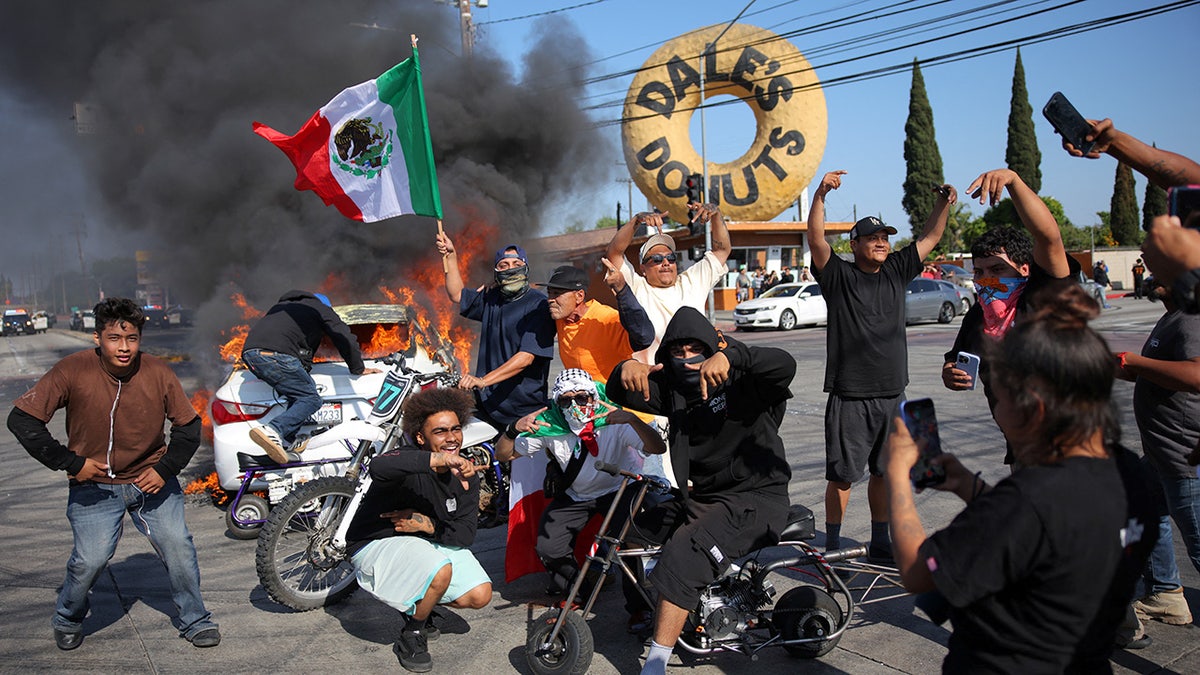
People hold Mexican flags and gesture next to a car in flames following multiple detentions by ICE, in the Los Angeles County city of Paramount, Calif., Saturday. (Reuters/Barbara Davidson)
Newsom noted California is deploying additional California Highway Patrol troopers to maintain safety on Los Angeles highways “to keep the peace.”
“It’s not their job to assist in federal immigration enforcement,” Newsom wrote in another post. “The federal government is sowing chaos so they can have an excuse to escalate. That is not the way any civilized country behaves.”
Vice President JD Vance clarified the border crisis is an invasion.
“One of the main technical issues in the immigration judicial battles is whether Biden’s border crisis counted as an ‘invasion.’ So now we have foreign nationals with no legal right to be in the country waving foreign flags and assaulting law enforcement. If only we had a good word for that…”
Videos and photos provided to Fox News by a federal source showed Border Patrol agents’ perspective from inside their vehicle as they attempted to leave the protest area.
Footage shows their vehicle being pelted with rocks, stones, and concrete, as the windshield shatters.
Federal sources stressed the violence at the Paramount riot could have killed an agent or caused a crash.
Banks shared a photo of a Border Patrol agent’s bloody hand, which was injured by a rock flying through the windshield.
“ANY attack on our agents or officers will not be tolerated,” Banks wrote on X. “You will be arrested and federally prosecuted.”

A Border Patrol agent receives medical attention after being injured by a flying rock. (Exclusive to FOX provided via Federal Source)
SOCIAL MEDIA, TRUMP ADMIN ERUPTS OVER LA MAYOR’S REACTION TO ICE RAIDS: ‘YOU’RE A CRIMINAL TOO’
While protesters reportedly targeted law enforcement vehicles, they also allegedly damaged and robbed nearby property.
FOX LA reporter Matthew Seedorff shared a video to X showing the station’s SUV with its windows smashed with bricks.
“F*** ICE” was spray painted in white on the passenger side of the car.

FOX LA’s work SUV was damaged by anti-ICE protesters in Paramount, Calif., Saturday. (@MattSeedorff via X)
“So this is what’s left of our work car,” Seedorff said in the video. “We had it parked near the scene. Obviously, we got here right at the beginning before we knew it was going to escalate to the situation that it got to. This is a brand-new news truck that we just got. Looks like the tires were slashed. They busted into the windows. Our personal bags were in the car [and] they stole all the stuff that was inside.”
In an interview with Fox News’ “The Big Weekend Show,” Homan said authorities are “stepping up” and “mobiliz[ing]” to address violence and destruction occurring near raid locations where demonstrators are gathering.
“American people, this is about enforcing the law, and again, we’re not going to apologize for doing it,” Homan said.
ICE operations in LA this week resulted in the arrest of 118 illegal immigrants, including five gang members and those with prior criminal histories of drug trafficking, assault, cruelty to children, domestic violence, robbery, and alien smuggling, according to the Department of Homeland Security (DHS). Nationwide, 2,000 illegal immigrants were arrested this week.
The Paramount protest comes less than 24 hours after more than 1,000 Los Angeles rioters surrounded a federal law enforcement building and assaulted ICE agents, slashed tires, and defaced buildings.

Police kick tear gas back toward a crowd as people block off the street and set a fire during protests against ICE and immigration raids on Saturday, in Paramount, Calif. (Myung J. Chun / Los Angeles Times via Getty Images)
ICE SWEEPS THROUGH LA BUSINESSES AS LOCAL DEMOCRATS CRY FOUL OVER TRUMP ADMINISTRATION’S ENFORCEMENT ACTIONS
Though Los Angeles Mayor Karen Bass did not immediately condemn the protests, she made a post on X late Saturday calling violence “unacceptable.”
“This is a difficult time for our city. As we recover from an unprecedented natural disaster, many in our community are feeling fear following recent federal immigration enforcement actions across Los Angeles County,” Bass wrote. “Reports of unrest outside the city, including in Paramount, are deeply concerning. We’ve been in direct contact with officials in Washington, D.C., and are working closely with law enforcement to find the best path forward. Everyone has the right to peacefully protest, but let me be clear: violence and destruction are unacceptable, and those responsible will be held accountable.”
DHS Secretary Kristi Noem took a stronger stance toward protesters.
“A message to the LA rioters: you will not stop us or slow us down,” Noem wrote in a post. “@ICEgov will continue to enforce the law. And if you lay a hand on a law enforcement officer, you will be prosecuted to the fullest extent of the law.”
FBI Deputy Director Dan Bongino said the agency is seeking information regarding the identity of those throwing rocks at vehicles conducting critical law enforcement operations.
“One of the perpetrators in this video is wearing a helmet, and we’re going to use our investigative tools to locate the individual,” Bongino wrote in an X post. “I strongly suggest you turn yourself in, it’s only a matter of time.”
The Los Angeles Police Department (LAPD) and Los Angeles County Fire Department did not immediately respond to Fox News Digital’s requests for comment.
This is a developing story. Please check back for updates.
Politics
The legal issues raised by Trump sending the National Guard to L.A.

The Trump administration announced Saturday that National Guard troops were being sent to Los Angeles — an action Gov. Gavin Newsom said he opposed. President Trump is activating the Guard by using powers that have been invoked only rarely.
Trump said in a memo to the Defense and Homeland Security departments that he was calling the National Guard into federal service under a provision called Title 10 to “temporarily protect ICE and other United States Government personnel who are performing Federal functions.”
What is Title 10?
Title 10 provides for activating National Guard troops for federal service. Such Title 10 orders can be used for deploying National Guard members in the United States or abroad.
Erwin Chemerinsky, one of the nation’s leading constitutional law scholars, said “for the federal government to take over the California National Guard, without the request of the governor, to put down protests is truly chilling.”
“It is using the military domestically to stop dissent,” said Chemerinsky, dean of the UC Berkeley School of Law. “It certainly sends a message as to how this administration is going to respond to protests. It is very frightening to see this done.”
Tom Homan, the Trump administration’s “border czar,” announced the plan to send the National Guard in an interview Saturday on Fox News as protesters continued confronting immigration agents during raids.
“This is about enforcing the law,” Homan said. “We’re not going to apologize for doing it. We’re stepping up.”
“We’re already ahead of the game. We were already mobilizing,” he added. “We’re gonna bring the National Guard in tonight. We’re gonna continue doing our job. We’re gonna push back on these people.”
In his memo, Trump cited “numerous incidents of violence and disorder,” and said federal immigration detention facilities are threatened.
“To the extent that protests or acts of violence directly inhibit the execution of the laws, they constitute a form of rebellion against the authority of the Government of the United States,” the president’s memo says.
Trump called into federal service at least 2,000 National Guard troops for 60 days — or “at the discretion of the Secretary of Defense.”
Newsom criticized the federal action, saying that local law enforcement was already mobilized and that sending in troops was a move that was “purposefully inflammatory” and would “only escalate tensions.”
The governor called the president and they spoke for about 40 minutes, according to the governor’s office.
Defense Secretary Pete Hegseth warned in a post on X that “if violence continues, active-duty Marines at Camp Pendleton will also be mobilized — they are on high alert.”
Newsom condemned that as a threat to deploy Marines against U.S. citizens and said: “This is deranged behavior.”
Other rarely used powers
Critics have raised concerns that Trump also might try to invoke the Insurrection Act of 1807 to activate troops as part of his campaign to deport large numbers of undocumented immigrants.
The president has the authority under the Insurrection Act to federalize the National Guard units of states to suppress “any insurrection, domestic violence, unlawful combination, or conspiracy” that “so hinders the execution of the laws” that any portion of the state’s inhabitants are deprived of a constitutional right and state authorities are unable or unwilling to protect that right.
The American Civil Liberties Union said Trump’s use of the military domestically is misguided and dangerous.
“President Trump’s deployment of federalized National Guard troops in response to protests is unnecessary, inflammatory, and an abuse of power,” said Hina Shamsi, director of the ACLU’s National Security Project. “By taking this action, the Trump administration is putting Angelenos in danger, creating legal and ethical jeopardy for troops, and recklessly undermining our foundational democratic principle that the military should not police civilians.”
According to the ACLU, Title 10 activation of National Guard troops has historically been rare and Congress has prohibited troops deployed under the law from providing “direct assistance” to civilian law enforcement — under both a separate provision of Title 10 as well as the Posse Comitatus Act.
The Insurrection Act, however, is viewed as an exception to the prohibitions under the Posse Comitatus Act.
In 1958, President Eisenhower invoked the Insurrection Act to deploy troops to Arkansas to enforce the Supreme Court’s decision ending racial segregation in schools, and to defend Black students against a violent mob.
Chemerinsky said invoking the Insurrection Act and nationalizing a state’s National Guard has been reserved for extreme circumstances in which there are no other alternatives to maintain the peace. Chemerinsky said he feared the Trump administration is seeking “to send a message to protesters of the willingness of the federal government to use federal troops to quell protests.”
Sen. Adam Schiff said in a social media post that “there is nothing President Trump would like more than a violent confrontation with protestors to justify the unjustifiable — invocation of the Insurrection Act or some form of martial law.”
In 1992, California Gov. Pete Wilson requested that President George H.W. Bush use the National Guard to quell the unrest in Los Angeles after police officers were acquitted in the beating of Rodney King. That was under a different provision of federal law that allows the president to use military force in the United States. That provision applies if a state governor or legislature requests it.
Jessica Levinson, a law professor at Loyola Marymount University Law School, said the president “is embracing a very broad view of executive power.”
“If the president does use the Insurrection Act,” Levinson said, “we’re going to see big legal battles in the next hours, days and weeks about whether or not those broad grants of authority can be used given these circumstances.”
She noted that while Newsom and Los Angeles Mayor Karen Bass have described the incidents as protests, the president has described it as a violent uprising.
“Everyone should pause when the president is using emergency powers and the governor and the mayor are saying, please don’t, we don’t need this,” Levinson said.
The Los Angeles Police Department said in a statement that demonstrations on Saturday “remained peaceful … and we commend all those who exercised their First Amendment rights responsibly.”
Chemerinsky wrote in an opinion article that the use of the military to quell protests “is something associated with dictators in foreign countries,” and that any military deployments in domestic situations “should be regarded as a last resort in the United States.”
“Unfortunately, President Trump likely has the legal authority to do this,” Chemerinsky wrote.
“This is not to deny that some of the anti-ICE protests turned violent. But they were limited in size and there is no reason to believe that law enforcement could not control them,” Chemerinsky said. “In the context of everything that we have seen from the Trump administration’s authoritarian actions, this recent action should make us even more afraid.”
California politics editor Phil Willon contributed to this report.
-

 News1 week ago
News1 week agoVideo: Faizan Zaki Wins Spelling Bee
-

 News1 week ago
News1 week agoVideo: Harvard Commencement Speaker Congratulates and Thanks Graduates
-

 Politics1 week ago
Politics1 week agoMichelle Obama facing backlash over claim about women's reproductive health
-

 Technology1 week ago
Technology1 week agoAI could consume more power than Bitcoin by the end of 2025
-

 Technology1 week ago
Technology1 week agoSEC drops Binance lawsuit in yet another gift to crypto
-

 Technology1 week ago
Technology1 week agoOpenAI wants ChatGPT to be a ‘super assistant’ for every part of your life
-

 World1 week ago
World1 week agoTwo killed in Russian attacks on Ukraine before possible talks in Turkiye
-

 Technology1 week ago
Technology1 week agoWhy do SpaceX rockets keep exploding?





